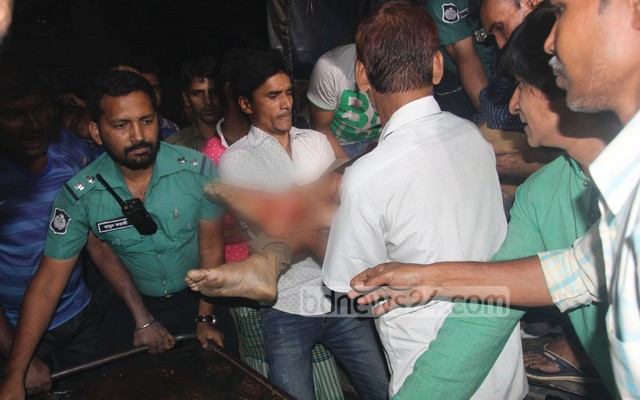The spectre of terror is upon us again. The attack on the offices of Shudhhashar, publisher of the works of the murdered blogger Avijit Roy, once again brings alive the audacity with which the forces of bigotry continue to pounce on the voices of liberalism in Bangladesh. In larger measure, this new attack that left Ahmedur Rashid Chowdhury Tutul, blogger Tareq Rahim and writer Ranadipam Basu grievously wounded came shortly before a new attack, this one on Faysal Arefin Dipon. As we prepare this report, we are confronted with the news of Dipon’s death, confirmation of which has come from none other than the police authorities. Terror thus comes upon us, once again, layered with deeper shades of malevolent darkness.
The country, it ought to be obvious to anyone, is in a state of deep malaise. These new attacks by the forces of fanaticism are a clear indication of the war the bigots have declared not just on bloggers but on the state of Bangladesh itself. Indeed, it is a war that we knew was coming, given the failure of the government to act against these forces of medieval darkness. The failure was certainly compounded by the rather obvious reluctance of the government to go tough on these elements on the ground, as stated by some individuals closely associated with the present political dispensation, that sensitivities were involved. It is now clear that the desire to take those sensitivities into consideration was essentially an unwillingness not to upset the feelings of those who had committed the crime of killing five bloggers and, in more recent times, two foreign citizens.
To that need to understand sensitivities was added the repeated warnings from powerful figures in the administration that no insult to religious sentiments would be tolerated. No one ever said that such should be the case, no one said that people could hurt religious sentiments and get away with them. But what was overlooked in the entire sordid episode of murder and the failure to bring the killers to justice was the larger social dimensions involved. Those dimensions centred around a coordinated, vicious assault on secular principles, an attack of grievous proportions on the state of Bangladesh itself. The assaults and the attacks met with a pusillanimous, shrug-of-the-shoulders response from the powers that be — that no criminal would be spared. What followed was predictable: the criminals were spared because they were not caught and they were not caught because, yes, sensitivities were involved.
The murder of Dipon and the wounds inflicted on the three individuals at Shuddhashar are a new and much more rude awakening for the citizens of this country than before. It does not matter what spin the government now tries to put on these new instances of criminality, for the truth is glaring: the war the bigots have declared against the state has come closer to our homes and streets, has now shaken up the edifice of the republic in a manner that simply cannot be explained away as stray incidents or mere instances of crime. The state has been hit once again, which means that before its earlier wounds have healed it has been subjected to fresh new murderous assaults. Those machete attacks on the four young men, together with the earlier killings of five bloggers, were in a bigger, more ominous way a clear turning of the knife in the soft innards of the state.
No, the state has not been brought to its knees. But these latest acts of criminality by the bigots are a dark hint of the many more and vicious ways it will suffer unless the country and those who govern it realize the truth which Bangladesh’s citizens have consistently comprehended — that it is time to move out of denial, to give short shrift to the sensitivities of criminals, to reassert the primacy of secular liberalism in the land.
The rule of law rests on unshakeable foundations of liberal politics. Those foundations have today been been subjected once again to seismic shocks. The degree to which this republic will or can steady itself and go after those who would throttle the life out of it depends on the seriousness of purpose the government is willing and ready to bring into its constitutional exercise of responsibility — that of ensuring the security of citizens and guaranteeing the survival and strengthening of a principle of life based on secure secular, liberal and therefore modern foundations of democracy. Nothing less will do. Nothing more is called for.
Syed Badrul Ahsan is a bdnews24.com columnist.
Source: bdnews24










